Has-Been Heroes Review: Good Ideas In A Frustrating Package
- Excellent combat system
- Fun when randomness works in your favor
- Good for pick-up-and-play gameplay
- Wacky item system that add artificial difficulty at first
- Seems to rely too much on randomness to force defeats
- Clever combat system is lost among frustrating mechanics
I'm not sure if you've noticed, but these super difficult games known as roguelikes – named for the 1980 game Rogue – seem to keep growing more and more popular. Distinguished by sometimes brutal difficulty, quick runthroughs that often end in failure, permadeath, and an element of randomness, these games are addicting in their challenge. You will fail a lot, but put in enough practice and maybe you'll finally succeed. There are already plenty of great roguelike games on the market – FTL: Faster Than Light, Rogue Legacy, The Binding of Isaac, and Spelunky, to name a few. Now Has-Been Heroes from Frozenbyte wants to add its name to that list. Does it have what it takes?Has-Been Heroes
Developer: Frozenbyte
Publisher: GameTrust
Platforms: PS4, XB1, PC, Switch (version tested)
Has-Been Heroes starts off by putting you in control of three heroes: a washed up warrior and monk who are past their prime and a young rogue who is eager to prove herself as a hero. As befits a group of has-beens, these three are tasked not with saving the world, but with escorting two princesses to school. The problem, apparently, is that an army of monsters separates these princesses from their studies, and they need someone to see them safely through.
With that, we're nearly ready to begin our adventure in Has-Been Heroes, but not before the game's combat system can be explained. When you encounter a group of enemies, the fight will take place on a three-lane battlefield, with each lane occupied by one of your heroes. Enemies will continuously advance down each lane, and it's up to you to fight them back. If they reach your heroes, they'll do damage, but if you damage an enemy, it'll be thrown further back into the lane.
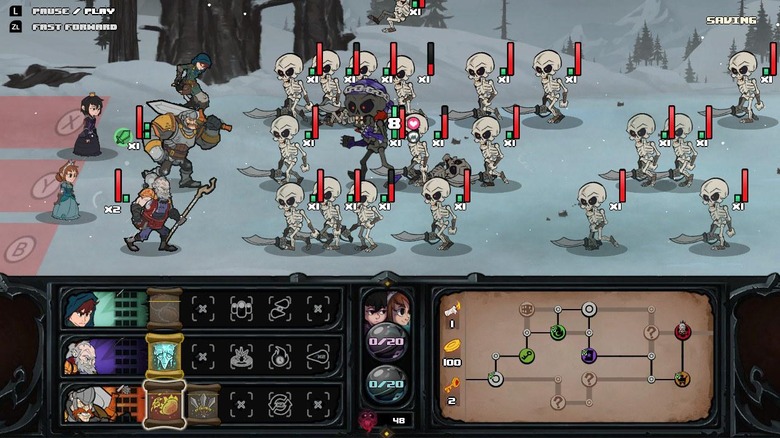
It'd be a fairly simple and lackluster battle system if it stopped there, but it doesn't. The entire combat system is based around a stamina sub-system. Each enemy will have a set amount of stamina in addition to their health bar, and you'll need to get through that stamina before you can damage them. Just as well, each of your heroes attacks a different number of times: the rogue attacks three times, the monk attacks twice, and the warrior attacks once (but does more damage than the rest). If you can match the number of your attacks with an opponent's stamina, they'll be stunned; attack again and not only will they take health damage and be pushed back in the lane, but they'll lose one stamina point permanently.
Playing around this system is critical, because forcing enemies to lose stamina ultimately means you can do more damage on subsequent attacks. Matching attacks to stamina quantities is done by swapping your heroes between lanes. By being smart about your swaps, you can hammer one lane with attacks, giving you the opportunity to whittle away an enemy with a lot of stamina.
It's very complex, so let's me explain a scenario. Say I have an enemy with five stamina coming down the lane my rogue is in. I attack with my rogue to do three stamina damage, then swap my monk to that lane and attack to do the remaining two stamina damage. Now the enemy is stunned, and I move my warrior to that lane to do the final attack, which does a lot of health damage, sends the enemy back in the lane, and permanently removes one stamina. When the enemy begins moving down the lane again, it'll only have four stamina protecting its health bar, which makes dealing with him more manageable.
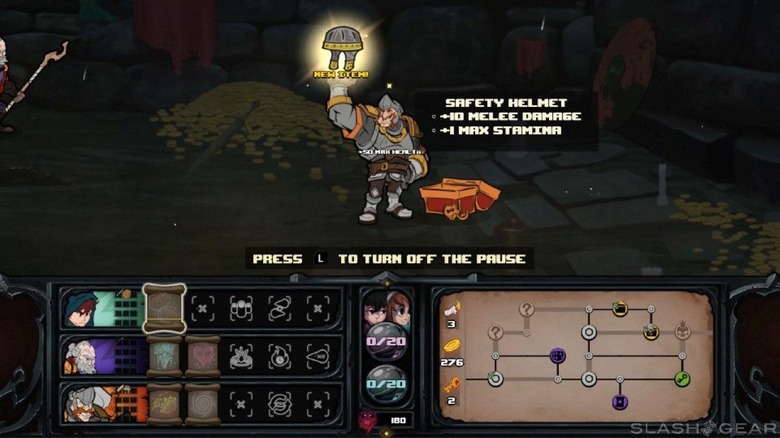
It's a very intriguing combat system, and I've never encountered anything like it before. What could have just been defending lanes becomes a combat system with a lot of depth. It forces you to plan out your attacks in advance, and it punishes you for neglecting to do so. You can pause the game at any time, so there's no reason not to consider the battlefield before you begin making your moves. When things work out, you're knocking around skeletons like nobody's business. All in all, it's a great combat system and I think Frozenbyte should be commended for coming up with it.
The combat system is only one part of the equation when crafting an excellent roguelike game, though. Developers making a roguelike walk a very fine line – make the game too difficult or too random and it's no fun to play; make it too easy and there not much incentive to sit through repeat playthroughs. It's clear that the combat system has been crafted with care and consideration, but that really only matters if the rest of the game has too. Unfortunately, Has-Been Heroes ultimately falls flat despite its intriguing approach to combat.
Part of this is due the game's approach to items. There are a lot of items – both equipable items and spells – that you'll stumble across as you play through Has-Been Heroes, but the first time you encounter each one, you have no idea what it does until one of your characters picks it up. This wouldn't be so much of an issue if you could switch items between characters, but you can't. So, during early playthoughs, you could very well encounter great item that is mostly wasted on a character who can't really get much out of it.
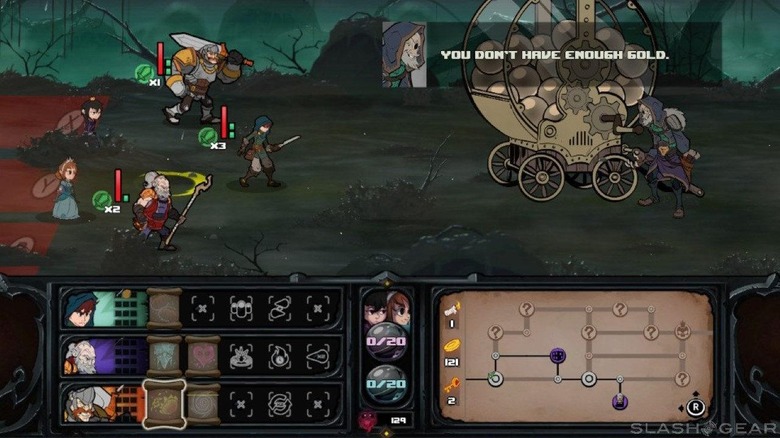
This is both infuriating and pointless. I understand that a good roguelike will have some element of randomness, but this ends up being too random. The only solution is to keep playing the game and unlock all of the items so you'll know who to equip them on the next time you encounter them. Just as well, this whole problem could have been avoided if we could switch items between characters, but that's not possible. Frozenbyte should have either told us what items do before we pick them up or allow us to move items between our heroes. By not doing either of those, it really feels like an attempt at artificial difficulty.
This is a major problem because you need to be well-equipped if you're going to beat the boss at the end of a run. These battles are particularly brutal, and I've never come close to completing one without items and additional spells. Granted, I have no problem admitting that I could just be awful at this game, but when items and spells seem so necessary, why are there so many roadblocks to getting the most out of them?
There are also points where it seems like battles can be lost by nothing but randomness. Sometimes a lane just seems so overwhelmed with enemies that you don't have much of a chance of clearing it, which can be frustrating since you lose the moment one of your heroes goes down. There is no chance to continue on with your two remaining heroes – the game simply ends when one hero falls.
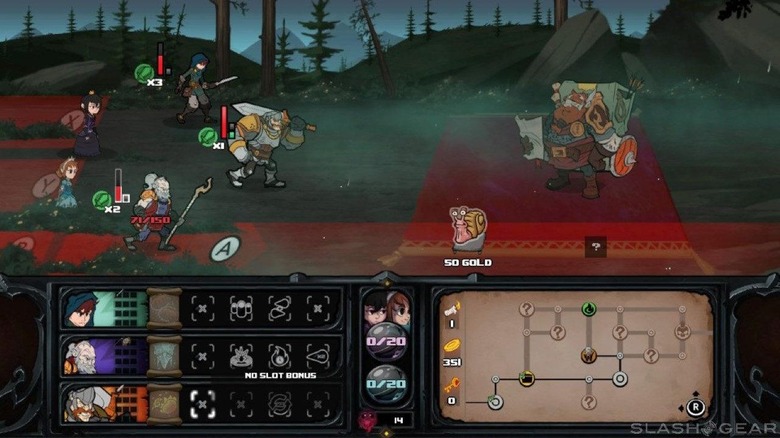
The way the game sends enemies at you plays into this. You always attack the first enemy in the lane, and those enemies are constantly moving toward your heroes. If there is a high priority enemy in a lane, then, I need to either wait until they move to the front or I need to burn attacks to get to them. Since your heroes have individual attack cooldowns, this sometimes means that there's nothing I can do to prevent dangerous enemies from getting to my heroes. Spells can help with this, but the rate at which you acquire new ones is too low to outright rely on them.
This causes a rather large disparity between battles where some are a breeze and some are blisteringly difficult. These difficulty spikes make for a fragmented experience where you never feel like you're getting stronger, only increasingly more lucky.
Ultimately, this game relies too much on randomness to force defeats. When I lose in a roguelike, I should lose because I made an incorrect decision, or because I got too greedy and engaged an enemy I wasn't prepared for. I shouldn't lose because the game prevents me from effectively managing items or because battles seem to randomly spike in difficulty.
Wrap-Up
Has-Been Heroes has some genuinely interesting features that we haven't seen in roguelikes before. The combat system seems awesome, but it's just too bad that the rest of the game gets in the way and prevents it from truly shining.
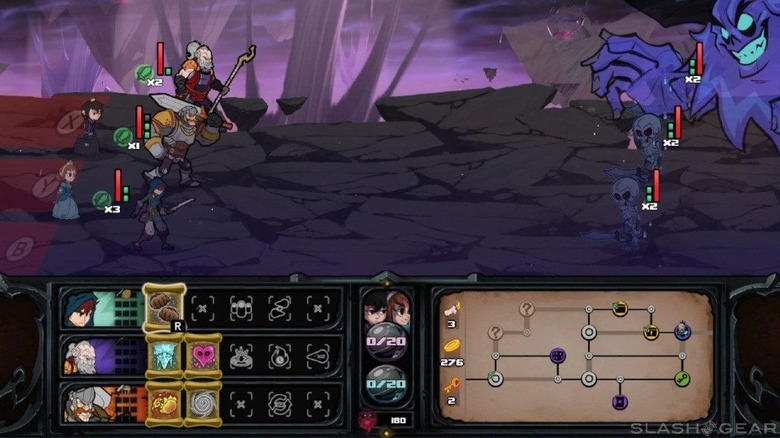
At the end of it all, it's difficult for me to recommend this game, which makes me sad because I would love to see what Frozenbyte is capable of with a refined approach to Has-Been Heroes. As it is, though, there are a lot of roguelikes out there that are worth your time. Has-Been Heroes simply isn't one of them.
I'm sure this game will find plenty of fans who make it through the frustrating opening stages and begin filling in the list of unlocks. When you can make educated decisions about who uses which items and which you pass up entirely, you have a much better chance of surviving. There is fun to be found in this game – perfectly managing your three lanes and mercilessly slaughtering all the enemies (which almost always seem to be skeletons, by the way) feels great – but that fun is too often stifled by the frustrating aspects of this game, in my opinion.
I did enjoy some of my time with Has-Been Heroes, but perhaps the most telling thing is that after a few successful runs (and many failed ones), I'm not driven to start a new run. Instead, I'd rather play any of the other roguelike games that do it better than Has-Been Heroes, which is a shame because the combat system in this game shows so much promise. In the end, though, it's bogged down by some questionable design decisions and an overall package that's painfully average.
For Switch owners, average may be okay for the time being, given the lack of games available for the console. Still, considering what's there is so good – The Legend of Zelda: Breath of the Wild comes to mind – even Switch owners may not need to settle for middle-of-the-road gaming experiences. For everyone else, though, you're probably better off skipping Has-Been Heroes in favor of the many excellent roguelike titles already available.
